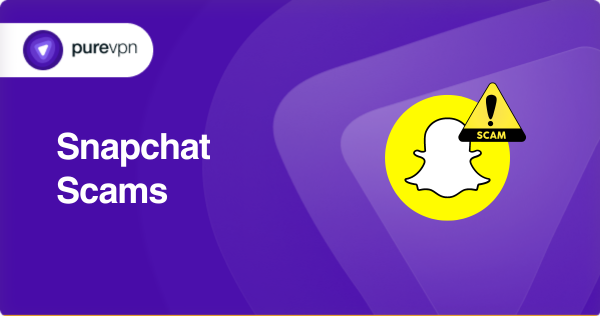Table of Contents
Sharing moments, keeping in touch with friends and family, and having fun on different social media platforms make you feel happy. It surely does! But certain features and privacy flaws could put you in danger.Snapchat is one of the favorite platforms of today. With its unique features and disappearing messages, it has kept a huge amount of data from customers, but is this safe? These attractive features could be the source of scams. Let’s discover some of the most common Snapchat scams, ways to avoid them, and what to do if you get trapped.
We will give you a handy solution you should always use while on social media. Shall we begin the journey?

Snapchat Scams: Shocking Stats & stories you must know
Snapchat has experienced several data breaches over the years, the most recent being in May 2019. It was discovered that Snapchat employees were spying on user accounts. They reportedly used the SnapLion tool initially designed to assist with law enforcement requests.
The employees used this tool for personal purposes, including accessing location information, phone numbers, and email addresses. And in July 2017, a phishing attack compromised the account passwords of over 55,000 Snapchat users.

Before that, in February 2016, a payroll department employee fell for a phishing attack and disclosed the payroll information of some current and former employees at Snapchat. And a third-party app hack in October 2014 resulted in the leak of 200,000 images.
That same year in January, hackers acquired: 4.6 million Snapchat accounts.
According to the latest Snapchat statistics [2023], the platform has 293 million daily active users. Most US users on the platform are millennials and Gen Z, and about 70% are women. On average, we spend 30 minutes a day on Snapchat.

Image source: Statista
What are Snapchat scams, and how do they work?
Snapchat scams are deceptive tactics scammers use to trick you into giving away personal information or money. These scams can be of many forms, from fake celebrity accounts to phishing messages disguised as official notifications from Snapchat.
Here are some most recurring scams you should know about
“Cash App” scams
It involves scammers sending messages to you, asking to send money through cash apps. The scammer may look like a friend or family member needing financial assistance or claiming to be a business or service offering a prize or reward for sending money. Once you send the money, the scammer runs away, leaving you no way to retrieve funds.

Source: Reddit user
To avoid falling victim to the cash scam, it’s crucial to only send money to people you know and trust. Be wary of unsolicited messages from strangers asking for money, and never send money to anyone claiming to offer a prize or reward in exchange for payment.
“Clickbait” scams
The clickbait scam involves scammers creating fake news stories or advertisements that entice you to click on a link. Once you hit the link, you will be directed to a fake website or asked to provide personal information, which can be used for identity theft or other fraudulent activities.

Source: Reddit discussion
It’s important to be cautious when clicking on links and to verify the authenticity of any news stories or advertisements before clicking on them. Avoid providing personal information to any suspicious websites or services, and be wary of unsolicited messages asking for personal information.
“Fake Celebrity” scams
The fake celebrity scam involves scammers creating fake accounts of popular celebrities and influencers and using these accounts to message you for personal information or money. These scammers may use convincing photos and videos to make their accounts seem legitimate and even engage in lengthy conversations with you to build trust.

Source: Reddit user
To avoid falling victim to the fake celebrity scam, it’s important to be wary of unsolicited messages from celebrity accounts and verify the authenticity of any messages or requests before responding.
“Phishing” scams
The phishing scam involves scammers sending messages disguised as official notifications from Snapchat, requesting personal information such as passwords or account details. These scammers may use convincing graphics and logos to make their messages seem legitimate and threaten to disable or delete your account if you do not comply with their request.

Source: Reddit user
To avoid falling victim to the phishing scam, it’s important to be wary of any unsolicited messages from Snapchat and verify the authenticity of any requests before responding.
Is there a way to spot a fake Snapchat account?
Fake Snapchat accounts can be difficult to spot, as scammers can use convincing photos and videos to make their accounts seem legitimate. However, there are a few key ways to spot a fake Snapchat account:
- You must check the username carefully: Fake accounts may use usernames similar to popular celebrities or influencers but may include extra characters or misspellings. Always double-check the username and verify the account before engaging with it.
- Try to find the source of the profile picture: Fake accounts may use photos or videos stolen from other sources or manipulated to make them look like celebrities or influencers. Use a reverse image search tool to verify the authenticity of the profile picture.
- Find out the snap score: A high snap score can indicate that an account is legitimate and has been active for a while. Fake accounts may have low or zero snap scores, indicating they are new or inactive.
- Check for verification: Some celebrities and influencers have verified accounts, indicated by a blue checkmark next to their username. If you get a message from an unverified account claiming to be a celebrity or influencer, it may be a fake account.
- Look at the account’s activity: Fake accounts may have little to no activity or only a few snaps or stories posted. Legitimate accounts will have regular activity and engagement with their followers. Be wary!
What should you do to safeguard yourself from scammers?
Here are some tips to safeguard yourself from scammers on Snapchat:
- Avoid adding or communicating with strangers, especially those who request personal information or financial assistance.
- Verify the authenticity of any messages or requests before responding to them. Scammers may use convincing photos, videos, or messages to make their accounts seem legitimate, so always double-check and verify their identity before engaging with them.
- Be cautious when clicking on links. Scammers may use clickbait tactics to lure you into clicking on malvertising links that can compromise your account or steal your personal information. Always verify the authenticity of any links before clicking on them.
- Avoid providing personal information. Scammers may use phishing tactics to request personal information such as passwords or account details. Never provide personal information to anyone you don’t know or trust, and report any suspicious messages or activity to Snapchat immediately.
- Use two-factor authentication. It adds security to your Snapchat account by requiring a verification code and password, which can help prevent unauthorized login to your account.
- Keep your app and device up to date. Updating your Snapchat app and device can help protect against security vulnerabilities and ensure you have the latest security features.
- Try taking the help of reliable VPN services.
What to do if you’ve been scammed?
Suppose you believe that you have been scammed on Snapchat. In that case, there are several steps you can take to protect yourself and report the incident:
- If you doubt your account has been compromised, change your password without delay to prevent further unauthorized access.
- You can report scams directly to Snapchat [here] by going to the app’s Support section and submitting a report. Be sure to include as much information as possible, including the username of the scammer, any messages or requests they sent, and any financial transactions.

- If you were scammed out of money or if the scam involved any illegal activity, report the incident to your local law enforcement agency or the Internet Crime Complaint Center (IC3).
- If the scam involves a financial transaction, immediately contact your bank or credit card company to report the fraudulent activity and request a chargeback if necessary.

- After being scammed, it’s important to be extra cautious of future interactions on Snapchat and other online platforms. Avoid engaging with strangers and be wary of any messages or requests that seem suspicious or too good to be true.
Note: Remember that it’s never too late to report a scam or seek help if you have been a victim of fraud. By taking swift action and reporting the incident to the appropriate authorities, you can help prevent others from falling victim to the same scam and protect yourself from further harm.
How can a VPN help you prevent scams?
A reliable VPN can help you avoid scams. By offering features to manage your privacy, identity, passwords, social media account, and encryption, PureSquare comes with cutting-edge technology to keep you secure at each digital interaction.
Here’s why you should make it your assistant:
PureVPN: Changes your IP address every time you log in to Snapchat, keeping you untraceable, hence safe.
PurePrivacy: Your social media partner to control your safety on social media.
PureKeep: Keep your passwords safe and unbreakable.
PureEncrypt: A cloud-based system to keep your data in a secure cloud.
Don’t fall for the scams that easily! Choose the right ways to keep yourself secure.
Bottom line: Don’t get into the scammy hands too easily
Scams are common on social media platforms. So, let it be Venmo, Tumblr, Steam, or Facebook; you are equally at risk of being scammed if you do not exercise due diligence.
Taking prompt action if caught by an attack is what you must do. Reporting to Snapchat and other law enforcement agencies is a must.
Most importantly, it is best to play on the safer side and engage with security tools like PureSquare to keep your digital safety a priority.
Frequently Asked Questions
The IC3 provides a mechanism to submit a report to the FBI concerning internet criminal activity to the FBIties. It makes sure that effective steps are taken to catch criminals.
Report your crime today at www.IC3.gov. A division of the FBI for cyber crimes.
This depends on a bank and its policies, contact your bank and explain what happened, and they might reimburse the amount.
By tracing the IP address of the scammers, they can be traced. If the IP was changed through a VPN then it might be difficult.
To constitute a scam means that a fraud is put into action, and it is a crime and must be reported to law enforcement agencies.
Yes, it is always best to contact the police if you have been scammed. Reach out to your local police department for help.
Yes. A VPN will hide your IP from Snapchat, by encrypting your data, which helps you go untraceable on Snapchat.
According to its privacy policies, Snapchat tracks your IP address and activities.



